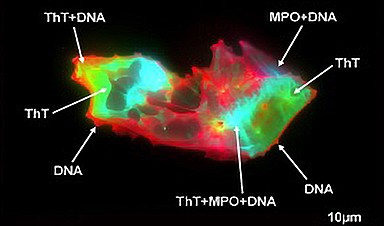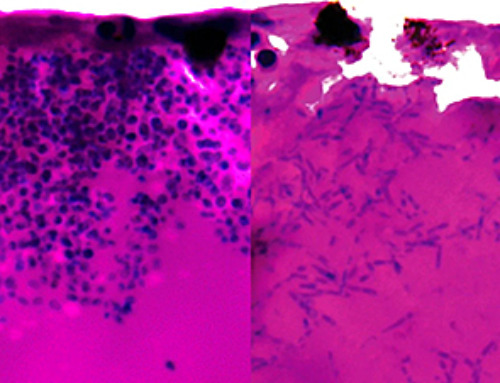Incorporating a personalized mRNA vaccine, designed to match an individual’s tumor genetics, into standard immunotherapy substantially boosts survival rates and reduces the recurrence of high-risk skin cancers in patients who have had these malignancies removed.
Global trials that could revolutionize cancer treatment and save countless lives are being led by scientists from Edith Cowan University (ECU).
Clinical Professor Adnan Khattak from ECU’s Centre for Precision Health recently unveiled the newest findings from these trials at the 2023 American Society of Oncology (ASCO) congress in Chicago. The ASCO congress, attracting more than 45,000 participants, is the largest cancer treatment conference worldwide.
After 18 months, cancer-free survival among patients who received the vaccine and the immunotherapy treatment was 78.6 percent, compared to 62.2 percent of those who only received the immunotherapy.
Two years after treatment, only 22.4 percent of patients who had received the vaccine/immunotherapy combination had either died or seen a recurrence of the disease, which rose to 40 percent for the immunotherapy-only group.
Overall, after an average of two years, those who received the vaccine saw a 44 percent lower risk of death or melanoma returning to the same area of the body, and a 65 percent reduction in the risk of death or the cancer returning in a different area of the body.
Crucially, there was no significant increase in rates of adverse side effects.
Professor Khattak said the trial began as a way of trying to address the shortcomings of current treatments.
“The current standard of care is immunotherapy using an antibody known as pembrolizumab,” he said.
“There are two main issues: first, despite having active immunotherapy for stage three melanoma, about half of the patients will relapse at five years.
“And secondly, it’s a very crude approach: currently if I treat 10 new high-risk melanoma patients, I give them the same drug; it’s not rocket science that it’s going to work for some but not others, and some may see side effects and others may not.
“This is the biggest trial to show treatment improves with an individualized approach — and I think research into personal cancer vaccines is going to increase dramatically after this positive study.”
Getting to know you — and your disease
Though vaccines are typically associated with disease prevention, in this instance the mRNA vaccine is used to treat people who have already been diagnosed with melanoma.
Samples of tissue are taken and analyzed to identify neoantigens, proteins that form on cancer cells, and which are unique to an individual’s tumor.
Up to 34 neoantigens may be identified, which are then added to an mRNA molecule and added to a vaccine.
The result is a personalized cancer treatment, with the neoantigens most likely to develop an immune response to help the patient’s body fight cancer.
Professor Khattak said it appeared to be more effective after an extended period of time and required multiple doses.
“In this study, the survival rate between the two groups is the same after 40 weeks, so early relapses happen for both,” he said.
“Some patients have fairly resistant tumors that aren’t going to respond to either of the treatments.
“But after the first 40 weeks, by then the patients have had two or three vaccine doses and the anti-tumor effect really kicks in.
“We see quite a significant proportion of patients relapsing after they finish pembrolizumab, whereas we’re not seeing such late relapses in patients who have done the double treatment because in addition to pembrolizumab, the effect of the vaccine kicks in with a much stronger anti-tumor immune response.”
Next steps
Professor Khattak will soon lead a new global trial of the treatment,
His clinic in Perth, Western Australia recruited the most participants of any site in the world.
“I would like to thank all my patients who took part in this research at a difficult point in their life,” Professor Khattak said.
The new trial will include more participants, some with earlier stages of melanoma.
“Stage two and stage three patients combined constitute quite a significant proportion of patients who could be potentially cured, rather than waiting for them to develop metastatic or advanced disease where most of them will not be curable,” he said.
If successful, the trial could be the starting point of a new approach to cancer treatment, beyond just melanoma.
“This is going to be the stepping stone for a number of trials,” Professor Khattak said.
“Because now they have expanded it into lung cancer, kidney cancers, and also into gastrointestinal cancers.
“This has the potential of becoming a new standard of care moving forward.”
Meeting: 2023 American Society of Oncology
Those looking for details on the trial can contact One Clinical Research.
The research was funded by Moderna, Merck Sharp and Dohme.
News
We May Never Know if AI Is Conscious, Says Cambridge Philosopher
As claims about conscious AI grow louder, a Cambridge philosopher argues that we lack the evidence to know whether machines can truly be conscious, let alone morally significant. A philosopher at the University of [...]
AI Helped Scientists Stop a Virus With One Tiny Change
Using AI, researchers identified one tiny molecular interaction that viruses need to infect cells. Disrupting it stopped the virus before infection could begin. Washington State University scientists have uncovered a method to interfere with a key [...]
Deadly Hospital Fungus May Finally Have a Weakness
A deadly, drug-resistant hospital fungus may finally have a weakness—and scientists think they’ve found it. Researchers have identified a genetic process that could open the door to new treatments for a dangerous fungal infection [...]
Fever-Proof Bird Flu Variant Could Fuel the Next Pandemic
Bird flu viruses present a significant risk to humans because they can continue replicating at temperatures higher than a typical fever. Fever is one of the body’s main tools for slowing or stopping viral [...]
What could the future of nanoscience look like?
Society has a lot to thank for nanoscience. From improved health monitoring to reducing the size of electronics, scientists’ ability to delve deeper and better understand chemistry at the nanoscale has opened up numerous [...]
Scientists Melt Cancer’s Hidden “Power Hubs” and Stop Tumor Growth
Researchers discovered that in a rare kidney cancer, RNA builds droplet-like hubs that act as growth control centers inside tumor cells. By engineering a molecular switch to dissolve these hubs, they were able to halt cancer [...]
Platelet-inspired nanoparticles could improve treatment of inflammatory diseases
Scientists have developed platelet-inspired nanoparticles that deliver anti-inflammatory drugs directly to brain-computer interface implants, doubling their effectiveness. Scientists have found a way to improve the performance of brain-computer interface (BCI) electrodes by delivering anti-inflammatory drugs directly [...]
After 150 years, a new chapter in cancer therapy is finally beginning
For decades, researchers have been looking for ways to destroy cancer cells in a targeted manner without further weakening the body. But for many patients whose immune system is severely impaired by chemotherapy or radiation, [...]
Older chemical libraries show promise for fighting resistant strains of COVID-19 virus
SARS‑CoV‑2, the virus that causes COVID-19, continues to mutate, with some newer strains becoming less responsive to current antiviral treatments like Paxlovid. Now, University of California San Diego scientists and an international team of [...]
Lower doses of immunotherapy for skin cancer give better results, study suggests
According to a new study, lower doses of approved immunotherapy for malignant melanoma can give better results against tumors, while reducing side effects. This is reported by researchers at Karolinska Institutet in the Journal of the National [...]
Researchers highlight five pathways through which microplastics can harm the brain
Microplastics could be fueling neurodegenerative diseases like Alzheimer's and Parkinson's, with a new study highlighting five ways microplastics can trigger inflammation and damage in the brain. More than 57 million people live with dementia, [...]
Tiny Metal Nanodots Obliterate Cancer Cells While Largely Sparing Healthy Tissue
Scientists have developed tiny metal-oxide particles that push cancer cells past their stress limits while sparing healthy tissue. An international team led by RMIT University has developed tiny particles called nanodots, crafted from a metallic compound, [...]
Gold Nanoclusters Could Supercharge Quantum Computers
Researchers found that gold “super atoms” can behave like the atoms in top-tier quantum systems—only far easier to scale. These tiny clusters can be customized at the molecular level, offering a powerful, tunable foundation [...]
A single shot of HPV vaccine may be enough to fight cervical cancer, study finds
WASHINGTON -- A single HPV vaccination appears just as effective as two doses at preventing the viral infection that causes cervical cancer, researchers reported Wednesday. HPV, or human papillomavirus, is very common and spread [...]
New technique overcomes technological barrier in 3D brain imaging
Scientists at the Swiss Light Source SLS have succeeded in mapping a piece of brain tissue in 3D at unprecedented resolution using X-rays, non-destructively. The breakthrough overcomes a long-standing technological barrier that had limited [...]
Scientists Uncover Hidden Blood Pattern in Long COVID
Researchers found persistent microclot and NET structures in Long COVID blood that may explain long-lasting symptoms. Researchers examining Long COVID have identified a structural connection between circulating microclots and neutrophil extracellular traps (NETs). The [...]





















